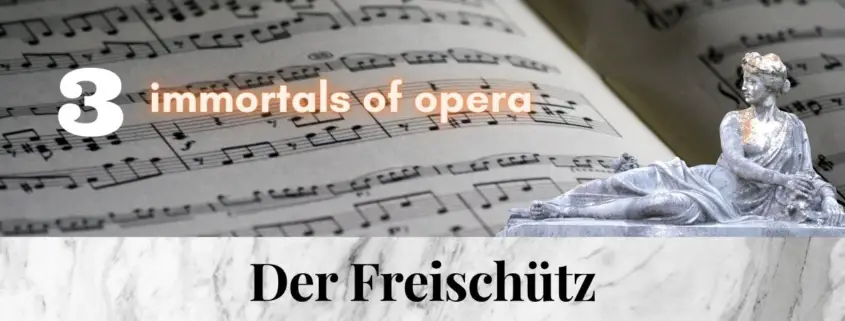Along with Wagner’s “Meistersinger von Nürnberg,” Freischütz is considered the German national opera par excellence. Von Weber shows himself to be a brilliant theater dramatist and creator of great melodies, and with this work he made a decisive contribution to the transfiguration of German Romanticism. Few operas have contributed as many melodies to the german song heritage as Freischütz. Weber’s greatest strength (and he had many) is his inspiration for melodies.
The Great Overture
The overture to Freischütz has rightly become famous. It is a showpiece of German Romanticism. Von Weber presents many of the opera’s melodies and lets the ghostly Wolfsschlucht music pass by. Weber was a gifted kappellmeister and knew how to create atmosphere. The dark tone of the low strings and the low horns create a spooky mood, which is enhanced by mysterious timpani beats.
As described in the opening text, we hear from the prelude the action of the drama and important memory motifs of this opera:
The prelude begins with a threatening motif that announces the coming disaster:
The hunter motif introduces the listener to the carefree world of hunters in whose ambience the music takes place.
The major of the hunter motif turns into a minor and describes the danger of the demonic:
The following passage shows the love motif, the “antidote” to the demonic, back in E-flat major:
The next minutes describe the struggle of good against evil (love motif and demon motif). At the end, the love motive sounds in radiant C major: good has won.
Vorspiel – Kleiber
The great Lied „Durch die Wälder durch die Auen“
The Singspiel was the genre of the people. Operas like the Freischütz are romantic pieces of the Biedermeier period, where fairy-tale material was popular. Thus the pieces of Freischütz are more songs than arias, in the sense that they are designed more simply and express more inner feeling than the often expressive drama of the aria. Let’s listen to “Durch die Wälder, durch die Auen”, one of the famous songs of this opera.
The aria is very diverse and consists of various passages: love, sadness and bitterness must be expressed credibly. It begins dramatically and after a short but beautiful transition by the clarinet the beautiful melody begins. A dark tremolo leads into the third dark and slow part, which again demands the dramatic qualities of the tenor.
First listen to Jonas Kaufmann in a beautifully arranged interpretation. Kaufmann is not only a master of the Puccini aria, but also a gifted song singer. Also in the dramatic parts he shines with his dark voice.
Durch die Wälder, durch die Auen (1) – Jonas Kaufmann
The great romantic Lied „Leise, leise fromme Weise“
It’s night, Agathe can’t sleep. She prays in the moonlit night that Max may return soon.
Agathe begins a song that belongs to the greatest treasures that German Romanticism has produced. It is an intimate prayer in a moonlit night. It ends in the ecstatic music of the overture when Max finally comes home.
The aria demands the soprano: crystal clear tones in the first part and lyrical but powerful lines in the second part. A slow introduction tunes us in to the mood of the full moon night. Agathe longs for Max. With a warm voice animated by love Agathe sings the beautiful cantilena “Leise, leise” (Softly, softly, pure song”)”. The singer has to turn this song into a prayer with the confidence but also the restraint a prayer requires. It must be sung in perfect legato.
In the second part the tone becomes more urgent. Horns announce the arrival of Max. The piece changes into an agitato: a recitative phase is introduced with “he is it”. The aria ends with the triumphant theme.
Elisabeth Schwarzkopf’s interpretation is of an overwhelming intensity and yet intimacy.
Wie nahte mir der Schlummer … Leise, leise, fromme Weise – Schwarzkopf











Leave a Reply
Want to join the discussion?Feel free to contribute!